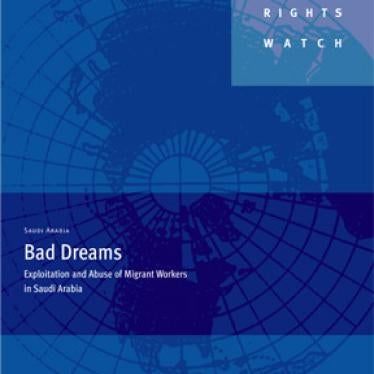(New York) - The killing of two Indonesian domestic workers by their employers in Saudi Arabia highlights the Saudi government’s ongoing failure to hold employers accountable for serious abuses, Human Rights Watch said today. The brutal beatings by these employers also left two other Indonesian domestic workers critically injured.
Seven members of a Saudi family who employed the four Indonesian women as domestic workers beat them in early August after accusing them of practicing “black magic” on the family’s teenage son. Siti Tarwiyah Slamet, 32, and Susmiyati Abdul Fulan, 28, died from their injuries. Ruminih Surtim, 25, and Tari Tarsim, 27, are receiving treatment in the Intensive Care Unit of Riyadh Medical Complex. Saudi authorities have detained the employers.
“The brutal killings of these Indonesian domestic workers occurred in an atmosphere of impunity fostered by government inaction,” said Nisha Varia, senior researcher in the Women’s Rights Division of Human Rights Watch. “Not only do the authorities typically fail to investigate or prosecute abusive employers, the criminal justice system also obstructs abused workers from seeking redress.”
Approximately 2 million women from Indonesia, Sri Lanka, the Philippines and other countries are employed as domestic workers in Saudi Arabia. They are routinely underpaid, overworked, confined to the workplace, or subject to verbal, physical, and sexual abuse, Human Rights Watch said. Despite being victims of abuse themselves, many domestic workers are subject to counteraccusations, including theft, adultery or fornication in cases of rape or witchcraft.
During visits to Saudi Arabia and Sri Lanka in November and December, Human Rights Watch interviewed Sri Lankan domestic workers sentenced to prison and whipping in Saudi Arabia after their employers had raped and impregnated them. Three months ago, an Indonesian domestic worker in al-Qasim province was sentenced to 10 years in prison and 2,000 lashes for witchcraft, a reduction from an original sentence of death. The Indonesian embassy did not learn about the arrest, detention or trial of the worker until one month after the sentencing.
Whether as victims or defendants, foreigners confront several serious problems in getting a fair investigation or trial in Saudi Arabia’s criminal justice system. Many migrant workers do not have access to interpreters, legal aid or basic information about their cases. The Saudi government often takes months or years to inform foreign missions if their nationals have been arrested or hospitalized, preventing them from extending badly needed assistance.
Cases often drag on for years. Nour Miyati, an Indonesian domestic worker, sustained serious injuries and lost her fingers due to gangrene in 2005 after her employer locked her up, physically and verbally abused her and deprived her of food. She then faced a countercharge of making false accusations against her employer, and was sentenced to 79 lashes. A court subsequently overturned that conviction and sentence, but she still awaits a final monetary settlement from her employer and the ability to return home to Indonesia after her ordeal.
“The Saudi government should train police how to investigate cases involving domestic workers, whose confrontations with employers often take place in private homes with few witnesses,” said Varia. “The government should also extend labor laws to protect domestic workers.”
Human Rights Watch also urged the Saudi government to reform immigration sponsorship laws that seriously disadvantage workers by forcing them to obtain their employers’ permission to leave the country or transfer employment. A recent reform allowing the Ministry of Labor to waive this requirement if the employer fails to pay three months of wages is insufficient to resolve these problems.
Saudi authorities and embassies of domestic workers’ home countries receive thousands of complaints of labor exploitation or abuse each year. Many more cases are likely unreported, given domestic workers’ isolation in private homes, employers’ ability to summarily have workers deported, and migrants’ lack of information about their rights. The Indonesian embassy alone currently has 300 women in its shelter, predominantly domestic workers complaining of abuse by employers and recruitment agents. In July, the shelter housed 500 women.







